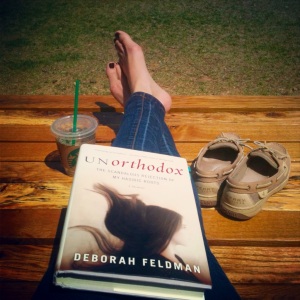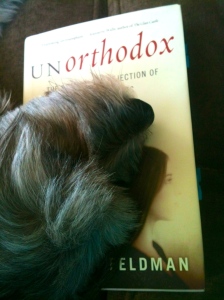I have been dying to get my hands on Unorthodox: The Scandalous Rejection of my Hasidic Roots by Deborah Feldman for a while!
I got a copy of the book recently, and was absolutely delighted to see that Unorthodox compared itself to Escape by Carolyn Jessup, since that is a book that I recommend to soooo many people (and if you haven’t picked up Escape, I’m recommending you to do so now)!
Anyway, on to the book itself.
Deborah Feldman grew up in a strict Hasidic Jewish community in Brooklyn. Her grandparents raised her because her parents were outcasts from the society. Rules were strict and relentless, and included such topics as clothing, haircuts, what was allowed to be read, etc.
As Deborah grew into her own, she started questioning and wanting more freedom, which was highly looked down upon. She married young, and because of this unhealthy marriage, developed severe anxiety.
At the age of 19, when she had a child of her own, Deborah found the courage to make some changes in order to secure her own happiness and the future of happiness for her child.
I was raised in a conservative Jewish household. We kept Kosher, I went to Temple, had a Bat Mitzvah, went to Hebrew School a few times a week. But I grew up able to wear shorts, have a proper education, go to college, and marry who I wanted to (who happens to not be Jewish) with plenty of happiness from my family.
I cannot imagine growing up in a strict household where the majority of the choices made on a daily basis were not my own. And once Deborah Feldman was able to look more critically at her own life, she realized that she did not want to either.
That doesn’t mean that being a strict religious Jewish person is a negative thing, it’s just that it wasn’t for Deborah. Just like my career choice of being a teacher isn’t for everyone.
Unorthodox allows you to enter the world of the Hasidic Jewish community of Satmar in Brooklyn. It also tells the tale of a woman brave enough to make changes in a life that she was unhappy with.
Here are some of the powerful quotes that spoke to me:
“I am not aware at this moment that I have lost my innocence. I will realize it many years later. One day I will look back and understand that just as there was a moment in my life when I realized where my power lay, there was also a specific moment when I stopped believing in authority just for its own sake and started coming to my own conclusions about the world I lived in.” – p. 29
“Bubby scoffs at my question. A Jew can never be a goy, she says, even if they try their hardest to become one. They may dress like one, speak like one, live like one, but Jewishness is something that can never be erased. Even Hitler knew that.” – p. 96: When Deborah as a child and her grandmother are discussing Jews and non-Jews.
“For a while I thought I could un-Jew myself. Then I realized that being Jewish is not in the ritual or the action. It is in one’s history. I am proud of being Jewish, because I think that’s where my indomitable spirit comes from, passed down from ancestors who burned in fired of persecution because of their blood, their faith.” -p. 251
I will recommend this book to others, both Jewish and non-Jewish, because in essence, it is a tale of breaking away from a strict society.
Thank you to my friend over at Touchstone Books for this amazing Simon and Schuster read!
Have you read any other “breaking out of the mold” books?




Even though I was raised Catholic, I don’t really have ties to an organized religion as an adult. I still love reading about religion from different perspectives and this sounds like a book I would really enjoy. Though it’s fiction, the last book I can think of that reminds me of this was Elders by Ryan McIlvain, which I really liked.
LikeLike
I’ll check it out! And I think that even people who weren’t raised Jewish will be able to identify with and understand Deborah’s situation. After all, I loved Escape by Carolyn Jessup and I’m not part of a Mormon polygamous family! 🙂
LikeLike
I have Escape but haven’t read it! This does sound interesting…I will look for it. I think you can be a serious committed (fill in the blank) and still “have a life” so to speak. The strict rules thing (when it comes to these religious situations) is legalism and it drives people further from God, who is their goal to begin with.
LikeLike
Yes!!!! You can be a serious (anything) and still be able to make choices. I think that’s what Deborah was searching for. Escape and Unorthodox are very similar so you probably want to read a book or two in between. Not similar as in what religion or situation, but the fact that they both were in strict religious environments and emerged. Another really great read was Stolen Lives: 20 Years in a Desert Jail. Nonfiction and fantastic. Check out the summary to see if it’s something that interests you. I tend to lump the 3 books together, even though Stolen Lives is very different, but it has the similar theme of a mother doing everything she can for her children.
LikeLike
I bought this when it came out, and I still haven’t read it. (The story of my life.) I think I need to read it soon.
LikeLike
Haha, I know how it is! I was going to read Cloud Atlas before the movie came out. . . same with Argo. . .
LikeLike
Honestly, I didn’t read the book but I was a bit curious. So I read another review that described her story. It said:
“She was subtly molested during a cleansing bath — a mikvah — to ensure her purity.”
and
“Like other Hasidic women, she was obligated to have sex during the first two weeks of her menstrual cycle, then after her period, required to lay twice-daily cotton squares on her bed to ensure she was “clean” enough to resume her marital duties. ”
I’m not Chassidish, but I do go to the mikvah and it is not like that at all. A Jewish women is (according to the law) treated with the utmost respect. She is the sole one responsible to check when she is “pure”. Also, according to Jewish law, a husband is actually the one who is “obligated” to provide for his wife’s sexual needs, not vice versa. Sex is also super private and personal, especially in Satmer, so I can’t believe that the community would know if she was still a virgin or when she had her period.
I hope that was she said was untrue and that she did not have such sad and painful experiences.
LikeLike
I think that reviewer was a little tough on the mikvah scene. She wasn’t really molested in any way, just a little meanly teased by the mikvah attendant. Deborah also suffered from severe anxiety, so the mikvah itself was not a pleasant experience for her, even after having positive ones (after the first not-so-nice experience).
With her sex life, the reason why the information got out was because of her mother-in-law. Her husband told his mother everything and she didn’t like Deborah, which is how the gossip spread. Deborah’s severe anxiety might have made it seem like everyone was discussing her sex life, even if that wasn’t the case.
I think that in all stories and situations, this is one person telling her story. It can’t be looked at as a representation of all Jewish communities, no matter how religious. It’s Deborah Feldman’s story, and she had a lot stacked up against her. Maybe if she had a more compassionate husband she would have been happier. Maybe if her mother had stayed she would have been happier. But if she’s truthful in all accounts, she had a not-so-fun experience and was more “freed” by being able to live her life outside of Satmar.
I’m so glad you commented here, though, because it is a good reminder to all who are reading this book, these posts, etc, that this is Deborah’s story, not the story of religious Jews.
LikeLike
Good to know. Thanks for explaining 🙂
LikeLike
Thank you for stopping by to help clarify! It’s good to have a religious Jewish perspective that’s positive, too!!! 🙂
LikeLike
This sounds so good to me Rebecca! I love learning about religions and cultures. I’ll definitely be keeping my eyes open for this. Thanks for the great review 🙂
LikeLike
You’re welcome! 🙂
LikeLike
Sounds fascinating! I grew up “Catholic”, but not really because my mom wasn’t any religion and my dad couldn’t be bothered. My grandma was religious but other than sending us to a Catholic school and dragging us to church sometimes, it wasn’t a major part of life, you know? So strict religious households like that kind of intrigue baffle me. My mind just has a hard time with the concept. Good for the author though, striking out on her own ideals!
LikeLike
I don’t think there’s anything wrong with religions or even strict cultures, but I’m proud of people who decide it’s not for them and time to leave. It’s kind of like getting married and having kids: lots of people do it, but if you don’t want to, you don’t have to. It’s got to be tough to go against the grain, but it can pay off in the long run if it’s what you really want.
LikeLike
I want to read Escape so this appeals to me, too. It’s really interesting reading books that fit your own life in a way but are still very different. You “get” all the frustrations but also you see the other side, too. Interesting that the author was brought up by her grandparents, you would’ve thought her parents would have taken her away with them.
LikeLike
Her mother was forced to leave her because of the reason why she left and her father had some issues and was kind of disowned but still part of the community. He was not fit to raise a child for sure.
LikeLike
I will definitely be reading this. Remind me of that when I say I don’t know what to read next because I have so many on my list 🙂
Did you seek this book out, or did someone find you?
LikeLike
I have actually been wanting to read this! It was recommended to me a couple of times. Satmer is known to be HIGHLY strict even in the religious world standards. It is a very closed off community that doesn’t allow for much outside influence. I’ve heard mixed reviews of this book and would be interested to see her perspective. I agree with Jennine all the way up on this comment list. The initial intent of the strictly religious is good, yet it seriously drives people away who might have a different view on how to carry out their religious beliefs.
I also love learning about religions and the often, unfortunately, dark side to religiosity.
Thanks, Rebecca!
LikeLike
I really do think you’d enjoy this book. It’s a slice of what occurs in the community, with some good and some bad. Deborah didn’t have a great experience, and this is her story of that, and of breaking out of the mold in order to be happy, which is highly commendable.
LikeLike
I’ll lend it to you once I get it back from a friend that’s here in town. I got it from my Touchstone Books contact. She had offered to send me a book or two so I asked for Unorthodox since I’ve been dying to read it!
LikeLike
Pingback: The Romance Reader: Why the title is so misleading | Love At First Book
This sounds like it would be a really good book club discussion book. Great review!
LikeLike
It would be. Good thinking! Now my brain is flowing with all good ideas on what to talk about if I used this in a book club. . .
LikeLike
Beautiful review…thanks so much for sharing.
Elizabeth
Silver’s Reviews
My Spread The Love Post
LikeLike
Thanks, Elizabeth! 😀
LikeLike
Pingback: Bye-Bye Religion: Mini-reviews - Love at First Book